Are you a Quiet Speculation member?
If not, now is a perfect time to join up! Our powerful tools, breaking-news analysis, and exclusive Discord channel will make sure you stay up to date and ahead of the curve.
Another eventful week of War of the Spark spoilers is in the books, and with it, another batch of wrapped-up brewing projects. As always, I've got some insights to share on that front today; this time dealing not with planeswalkers, but utility creatures. Dreadhorde Arcanist, for all its Snapcaster/Confidant imitations, struck me as a potential Modern-playable the moment I saw it. I've spent the past week refining a Delver shell that integrates the Zombie Wizard.
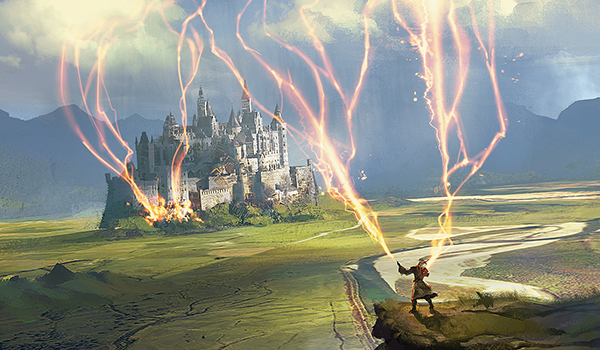
Evaluating Dreadhorde
In this section, we'll compare Dreadhorde Arcanist to its obvious foils and see how it lines up.
Dreadhorde vs. Snapcaster Mage
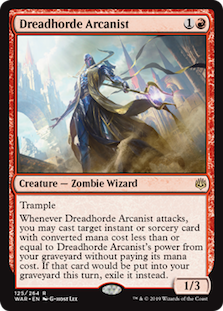 Far and away the most common parallel I've encountered is between Dreadhorde and Snapcaster Mage. True, they both dig instants or sorceries out of the graveyard, but the two are miles apart in terms of play. Snap provides a small burst of value and gives players the card immediately, while Arcanist makes them wait, but promises further resources down the road. Additionally, Snapcaster charges for the flashbacked spell, while Arcanist casts it for free if it lives for a turn cycle. And finally, the blue Wizard has flash, ensuring it remains a contender in control shells, while Arcanist seems destined for aggro-control.
Far and away the most common parallel I've encountered is between Dreadhorde and Snapcaster Mage. True, they both dig instants or sorceries out of the graveyard, but the two are miles apart in terms of play. Snap provides a small burst of value and gives players the card immediately, while Arcanist makes them wait, but promises further resources down the road. Additionally, Snapcaster charges for the flashbacked spell, while Arcanist casts it for free if it lives for a turn cycle. And finally, the blue Wizard has flash, ensuring it remains a contender in control shells, while Arcanist seems destined for aggro-control.
Dreadhorde vs. Dark Confidant
This is a comparison I haven't heard anywhere, but I think Arcanist is much closer in function to Dark Confidant than it is to Snapcaster. It provides a recurring source of card advantage as of the turn its controller untaps with it, and until opponents find a way to deal with it: in Confidant's case, by attacking its pilot's life total; in Arcanist's, by either killing it or sticking a blocker. This key difference is one of a few that differentiate Bob from the newcomer.
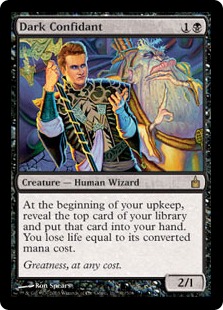 Dark Confidant requires two things of pilots. Deckbuilding-wise, their deck must be sparing with high-CMC spells, lest the creature outright kill its controller by revealing something like Tasigur, the Golden Fang. Arcanist has a similar condition: it demands players run a critical mass of one-mana instants and sorceries. While that condition is more specific and harder to meet than Bob's, it also allows players the wiggle room to run high-cost spells should they so desire.
Dark Confidant requires two things of pilots. Deckbuilding-wise, their deck must be sparing with high-CMC spells, lest the creature outright kill its controller by revealing something like Tasigur, the Golden Fang. Arcanist has a similar condition: it demands players run a critical mass of one-mana instants and sorceries. While that condition is more specific and harder to meet than Bob's, it also allows players the wiggle room to run high-cost spells should they so desire.
A nuance to this point is that Confidant rewards players for running many lands, a habit increasingly looking suspect in Modern as even the dominant rock decks are starting to trend Turbo Xerox in their construction (cantrip-heavy, land-light shells which increase consistency over long games, e.g. Grixis Shadow). On this deck construction metric, I think Arcanist slightly wins out over Bob, as cantrip-stocked decks have proven themselves better than land-heavy ones in this metagame (and, perhaps, in Magic).
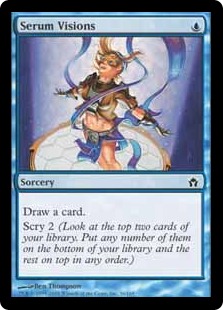 Moving beyond deck construction, we can examine Confidant's second requirement: life. The Human taxes players life points for cards, and stops working when players run low on that resource. Conversely, Arcanist asks players to have one-mana instants or sorceries in the graveyard, something significantly tougher to achieve for most players, but perhaps trivial in the right shell; otherwise, it too stops working. On the plus side, though, choosing from a makeshift toolbox of cheap spells probably beats drawing a random card, especially when some of those spells are cantrips with tacked-on library manipulation. Arcanist's effect has a higher ceiling.
Moving beyond deck construction, we can examine Confidant's second requirement: life. The Human taxes players life points for cards, and stops working when players run low on that resource. Conversely, Arcanist asks players to have one-mana instants or sorceries in the graveyard, something significantly tougher to achieve for most players, but perhaps trivial in the right shell; otherwise, it too stops working. On the plus side, though, choosing from a makeshift toolbox of cheap spells probably beats drawing a random card, especially when some of those spells are cantrips with tacked-on library manipulation. Arcanist's effect has a higher ceiling.
Life is usually in short supply down the road but in abundance early, and the inverse is true of spells in the graveyard. So I'd assess that overall, Confidant is better early-game, while Arcanist has the upper hand later. There are exceptions, of course; Arcanist is stronger against Burn; Confidant is more reliable against Rest in Peace; etc. Similarly, I think a deck can be built to consistently ensure Arcanist resembles Dark Confidant as of turn two.
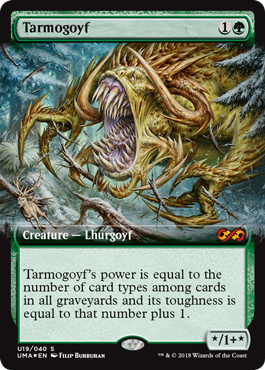 Arcanist has one additional condition, though, that Confidant lacks: it needs to attack to activate its effect. That means that staring down the likes of Tarmogoyf, the 1/3 can't even help pilots find answers to such a game state, while Confidant is happy to draw players out of board stalls. This condition is perhaps tougher to account for. It helps that Arcanist is red, the color of direct damage spells. These cards remove blockers, but also maintain relevance against players lacking creatures, which is the kind of versatility we'll need from an effect Arcanist incentivizes us to load up on.
Arcanist has one additional condition, though, that Confidant lacks: it needs to attack to activate its effect. That means that staring down the likes of Tarmogoyf, the 1/3 can't even help pilots find answers to such a game state, while Confidant is happy to draw players out of board stalls. This condition is perhaps tougher to account for. It helps that Arcanist is red, the color of direct damage spells. These cards remove blockers, but also maintain relevance against players lacking creatures, which is the kind of versatility we'll need from an effect Arcanist incentivizes us to load up on.
The final point of comparison is stats, which I evaluate as about even. 2 power is twice as much as 1 when it comes to bringing the beats, but Arcanist's surgical selection somewhat makes up for its lower damage output; it can flashback Lightning Bolt, after all. As for toughness, 3 is much greater than 1, especially since every point matters in Modern these days. Confidant dies to literally everything, including Gut Shot; Arcanist survives Stage 1 creature removal like Collective Brutality, Magma Spray, and Pyroclasm, which is ideal for sniping early-game threats that would otherwise put players on the back foot. Besides Bolt, it mostly just dies to the heavy-duty stuff reserved for Tarmogoyf, Crackling Drake, and other Stage 2 creatures: Fatal Push, Lightning Axe, Path to Exile, etc.
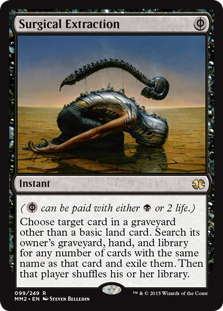 Play Parameters
Play Parameters
Given how the metagame has congealed around Arclight Phoenix, I decided to construct the Dreadhorde Arcanist deck in a way informed by that shape. After all, most of my testing would be done using free online clients, presumably against meta-conscious opponents. The most recent data I had access to identified Lightning Bolt as the most-played mainboard card and Surgical Extraction as the likeliest sideboard include, so my build set about mitigating the impact both those cards would have on my gameplan.
Beating Surgical
As I've written, UR decks not featuring Arclight Phoenix are already quite good against Surgical Extraction. To keep from being a much worse version of the established best deck, though, I retained its other threat, Thing in the Ice. Thing gives us ample game against go-wide and combo-oriented creature decks alike, allowing us to point most of our burn at opponents.
Beating Bolt
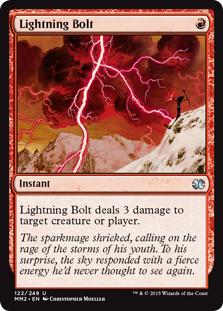 That leaves Lightning Bolt, a card that conveniently trades up on mana against Dreadhorde Arcanist. Also convenient, except for us this time, is the Zombie's high toughness; Mutagenic Growth saves it from all kinds of stats-matter removal spells, including Bolt and even Flame Slash. Protecting Confidant while tapped out is a powerful, if unreliable, gameplan I tried four years ago in "Some Bobs With Your Bugs: Confidant in Delver." Mutagenic asks far less of us than Disrupting Shoal did, although it only works against stat-based removal.
That leaves Lightning Bolt, a card that conveniently trades up on mana against Dreadhorde Arcanist. Also convenient, except for us this time, is the Zombie's high toughness; Mutagenic Growth saves it from all kinds of stats-matter removal spells, including Bolt and even Flame Slash. Protecting Confidant while tapped out is a powerful, if unreliable, gameplan I tried four years ago in "Some Bobs With Your Bugs: Confidant in Delver." Mutagenic asks far less of us than Disrupting Shoal did, although it only works against stat-based removal.
Alongside Arcanist, Mutagenic has additional utility. It can pump the 1/3 from the hand and then be flashed back, giving us a 5-power trample for the turn. And a buffed Arcanist can flash back pricier spells than just one-drops.
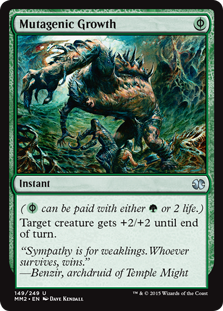 While Mutagenic Growth is an elegant answer to Lightning Bolt, and plays nice with Arcanist otherwise, I wanted it to do more in this shell. Maximizing the instant meant employing a Stage 1 combat creature that also fades Bolt with some help from the pump; the 2 damage from Growth would need to add up somehow. I settled on Delver of Secrets, although Monastery Swiftspear is also probably worth a look. Since Delver is a Wizard, this choice opened the door for Wizard's Lightning, a powerful option that can even be re-used by Arcanist when it's 3/5 or larger.
While Mutagenic Growth is an elegant answer to Lightning Bolt, and plays nice with Arcanist otherwise, I wanted it to do more in this shell. Maximizing the instant meant employing a Stage 1 combat creature that also fades Bolt with some help from the pump; the 2 damage from Growth would need to add up somehow. I settled on Delver of Secrets, although Monastery Swiftspear is also probably worth a look. Since Delver is a Wizard, this choice opened the door for Wizard's Lightning, a powerful option that can even be re-used by Arcanist when it's 3/5 or larger.
Thing in the Ice also interacts nicely with Growth. The instant saves Thing from spells run in Modern specifically to kill it, such as Flame Slash, Dismember, and Lightning Axe. But the instant's real appeal is its propensity for flipping thing early, or while tapped out.
Here's the list I landed on:
UR Delver, by Jordan Boisvert
Card Choices
Snapcaster Mage: While I think Arcanist is better in this deck overall, we can only run 4, and I still like the utility Snapcaster provides. Between the flash, the immediate flashback, and the body, no other card in Modern does all this creature does. Bouncing Snap with Thing also occasionally comes up and is nice.
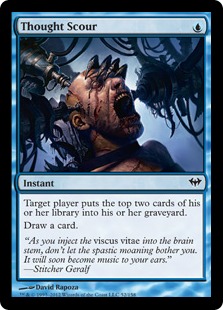 Thought Scour: One of Modern's best cantrips, Scour's issue is that running it often means dipping deep enough into a graveyard strategy that enemy hosers become serious threats. Just as I've found Grim Lavamancer to assuage this conundrum, Dreadhorde Arcanist fills a similar role. Scour is great at stocking the 'yard for the Zombie.
Thought Scour: One of Modern's best cantrips, Scour's issue is that running it often means dipping deep enough into a graveyard strategy that enemy hosers become serious threats. Just as I've found Grim Lavamancer to assuage this conundrum, Dreadhorde Arcanist fills a similar role. Scour is great at stocking the 'yard for the Zombie.
Opt: My additional cantrip of choice after Serum Visions and Thought Scour. I tried Faithless Looting in small numbers, but was more impressed with the raw card advantage offered by a self-replacing cantrip alongside Arcanist.
Vapor Snag: A way to quickly clear lager threats so Arcanist can crash through. Combined with the creature, Snag makes for a potent removal engine. If opponents only have one big beater, we can bounce it, swing, flash back a cantrip, and next turn swing and bounce all over again; when multiple targets are in play, we can bounce two in a single combat step, and before blockers to boot. I didn't want many of these because of its redundancy with Thing, but the instant tested very well.
Spell Pierce: Pierce has no synergy with Arcanist, but I hold that it's terrific right now, and in the tempo-sensitive Modern generally. It was also important to me to have some dedicated stack interaction available. Our many cantrips help find Pierce before something critical like Through the Breach or Ad Nauseam can resolve.
Other Possibilities and Closing Thoughts
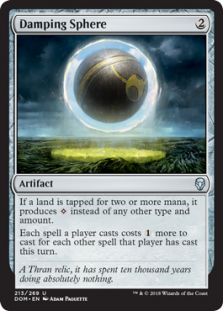 UR Delver featuring Mutagenic Growth was actually the third of a few decks I tried with Dreadhorde Arcanist. I also tested a more dedicated Wizards shell, and a midrange build in Grixis colors. Neither of those strategies were fast enough to race Tron, though; Lightning, Pierce, Growth, and Delver all help with this matchup, as do the Damping Spheres. But it's fully possible my deckbuilding biases are at work here, as they often are in my articles, and Arcanist is better suited in a deck without Delver. As always, I'll happily receive advice and opinions in the comments; until then, happy spoiler season!
UR Delver featuring Mutagenic Growth was actually the third of a few decks I tried with Dreadhorde Arcanist. I also tested a more dedicated Wizards shell, and a midrange build in Grixis colors. Neither of those strategies were fast enough to race Tron, though; Lightning, Pierce, Growth, and Delver all help with this matchup, as do the Damping Spheres. But it's fully possible my deckbuilding biases are at work here, as they often are in my articles, and Arcanist is better suited in a deck without Delver. As always, I'll happily receive advice and opinions in the comments; until then, happy spoiler season!




Excellent article. The Bob comparison is much closer than snap.
One additional angle with the Arcanist is his potential to abuse suspend spells. Unlike snap; his ability casts Ancestral Visions and Wheel of Fate.
Draw 7s usually have the downside of you having to spend mana on them and your opponent getting first bite at the cherry – casting Wheel off Arcanist means you get your second main phase with your fresh 7 and potentially all your mana.
If you do go that direction, faithless looting suddenly looks good again, as your suspend cards aren’t great in your hand. Both Wheel and Vision mean you really don’t care about card advantage anymore.
These push toward Electrodominance (more card disadvantage and an alternate way to cast suspend) and the host of other spells matter creatures
– Young pyromancer, Jace Vryns Prodigy, the draw 3 devil who’s name escapes me Rn, and of course, the Phoenix himself.
This implies a slot in either slightly modified Phoenix decks, or a return to a pyromancer shell.
The other direction is towards attrition – skip Wheel and play only visions and jam lots of Thoughtseize, which is a great spell with Arcanist. Once you’re in black and casting multiple mutagenics, and thoughtseize, then you could consider a deaths shadow shell instead.
I started working on a brew featuring those kinds of synergies the moment I saw Finale of Promise. The trouble right now is finding more discard outlets without splashing B for Brutality, since I don’t want to have to dip into Electrodom. The attrition route strikes me as a losing proposition against decks like Tron, unless maybe As Foretold is adopted alongside Restore Balance…?! Simian Guide is nice on that plan, and also enables Blood Moon! Loving these spoilers ^_^
Do you think arcanist is better or worse than finale of promise? Similar effects, both happen on turn three, roughly, each have a benefit the other doesnt
Arcanist seems easier to build around as a gameplan, and is inherently more splashable as a creature. But I think both cards are good and may have homes. Of note in Modern, Finale instantly revives all Arclight Phoenixes!
I was thinking that exactly! Obviously because it gets played later it’s more susceptible to counter spells and discard spells, but arcanist is susceptible to those and removal, of course it’s a permanent.
I already preordered finale to put into my B/R pheonix. I feel like it will be perfect for that shell and make it consistent.
No kidding. I tried Finale a little in Mono Red and it seems great there over the more situational top-end stuff like Bedlam Reveler. Just wish we had more good sorceries to run. In black, you get targeted discard!
Exactly! Right now I have to make the choice of holding my bolts, thought siezes, and Lootings or be aggressive with them. With Finale, I am rewarded for playing ultra aggressively on turns one and two knowing that one turn three I can refuse them while returning pheonixes. Its perfect
I feel like this is more a card destined to the spellslinger decks like Kiln Fiend decks. Also, I really love the synergy it’s got with Become Immense. 😉
I feel like those decks have enough pump spells that it might be tough to squeeze in the requisite number of “useful” one-mana spells (cantrips) to extract the most value from Arcanist. With another creature on the board it’s better, but those decks are already winning when they set that up.